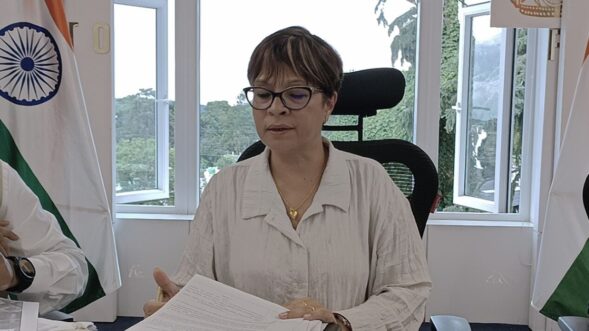
SHILLONG:
The Supreme Court, on January 6, stayed the Meghalaya High Court’s order relating to the operation of the Memorandum of Understanding (MoU) between Assam and Meghalaya with regards to physical demarcation and erection of boundary posts between the two states.
A bench of Chief Justice of India (CJI) DY Chandrachud, PS Narasimha, and JB Pardiwala issued notice to the respondents in the appeal filed by State of Meghalaya and listed the case for further hearing after two weeks.
“Prima facie, the single-judge has not furnished any reason for the interim order, and whether the MoUs will require parliamentary approval is a distinct issue. But the interim order staying the MoU was not warranted. Thus, the interim order of the single-judge is hereby stayed,” the Court ordered.
On December 8, last year the Meghalaya High Court had directed that no physical demarcation and erection of boundary posts on the ground in Assam-Meghalaya border till February 6.
The order was passed by the Single Bench after hearing a petition which sought a stay to the operation of the Memorandum of Understanding (MoU) signed between Assam and Meghalaya on March 29.
The petition was filed by four traditional chiefs – Syiem of Jirang R Hamberly Wahlang, Acting Syiem of Hima Mylliem Ainam Manik, Sirdar of Nonglang Sirdarship Pholasly Nianglang and Acting Chief of Nongspung Syiemship Erald Jyrwa.
“It is however understood that during the intervening period, no physical demarcation or erection of boundary posts on the ground, pursuant to the MoU dated 29.03.2022 shall be carried out, till the next date,” Justice HS Thangkhiew had said in his order.
The traditional chiefs in their petition had requested the court to set aside the MoU signed between Assam and Meghalaya as it is contrary to Article 3, 13, 29 (1) and the Sixth Schedule to the Constitution which has resulted in violation of the fundamental rights guaranteed under Article 14 and 21 of the Constitution and further to pass appropriate direction to the respondent states to follow the Sixth Schedule in letter and spirit before entering into any agreement for handing over of land which are under the autonomous district council in the state of Meghalaya.
They alleged that the MoU was signed without consulting or taking the consent of or involving the constitutionally recognized native chiefs and their durbars such as petition Syiems and Sirdar, etc, under the Sixth Schedule of the Constitution and also the Khasi Hills Autonomous District Council.
The traditional chiefs further stated that the MoU is in principle contrary to the provision of Article 3 of the Constitution under which the Parliament exclusively is competent to alter the area or boundaries of existing states and there are no correspondent entry in the Seventh Schedule which means that the states do not have the authority to determine changing the boundaries of the existing states.
Further, they said that the MoU is itself violative of the agreed principles between the two states for settling the boundary disputes i.e, principles of historical perspective, ethnicity of local population, continuity with boundary, people’s will and administrative convenience as yardstick.
During the hearing by High Court, counsel for the petitioners P Sharma had submitted that in the event the demarcation is effected physically and boundary marks are placed on the ground pursuant to the MoU, the entire writ petition will be rendered infructuous, and the writ petitioners will be without any remedy.
Advocate General A Kumar had submitted that no interim orders are called for at this stage as firstly, the locus of the petitioner has not been established and further no irreparable loss would be caused to the applicants/petitioners, in the event the MoU is carried forward.
The High Court however had said looking into the nature of the matter and the submissions made by the learned AG, it appears that an objection in the form of an affidavit is necessary to be filed to enable this Court to consider the interim prayer as prayed by the applicants/petitioners.
“The learned AG is accordingly permitted to file objections to the interim prayer and to the maintainability of the writ petition,” it said.
On March 29, Meghalaya chief minister Conrad K Sangma and Assam chief minister Himanta Biswa Sarma had signed the MoU in the presence of Union Home Minister Amit Shah.
The six areas of difference which were resolved after the MoU was inked include Tarabari (4.69 sq km), Gizang (13.53 sq km), Hahim (3.51 sq km), Boklapara (1.57 sq kms), Khanapara-Pilangkata (2.29 sq kms) and Ratacherra (11.20 sq kms).
The total area is 36.79 sq kms.
After detailed discussion, surveys and visits made by the regional committees, approximately 18 sq kms will come to Meghalaya and 18 sq km will go to Assam.
Meanwhile, the two states have also started the second phase of border talks for resolving the remaining six areas of difference which include – Langpih in West Khasi Hills District, Borduar, Nongwah-Mawtamur, Deshdoomreah, Block-II in Ri Bhoi district and Block-I, Psiar-Khanduli in West Jaintia Hills district.






